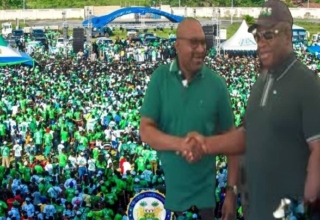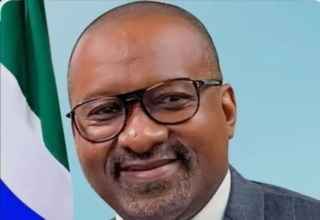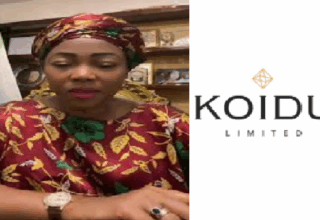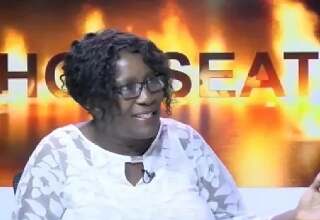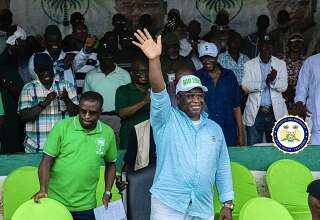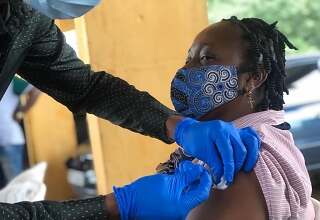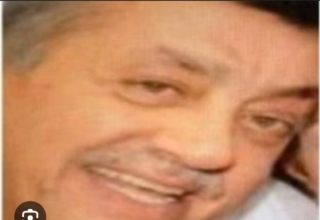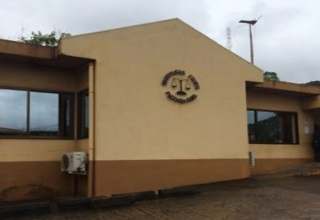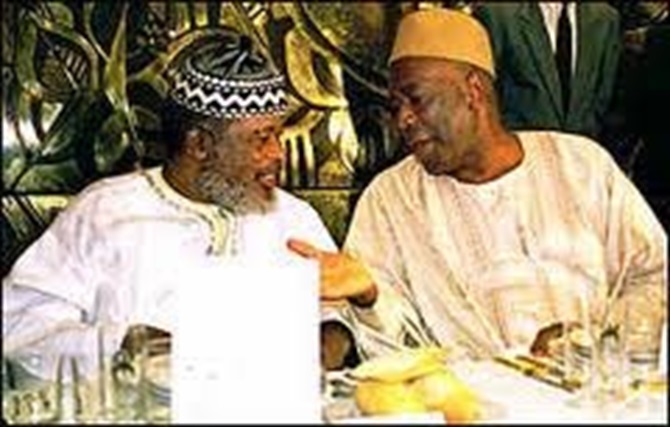
𝐁𝐲 𝐀𝐥𝐡𝐚𝐣𝐢 𝐈𝐛𝐫𝐚𝐡𝐢𝐦 𝐁𝐞𝐧 𝐊𝐚𝐫𝐠𝐛𝐨.
President Ahmad Tejan Kabbah will always be remembered by all Sierra Leoneans as the patriot who saved Sierra Leone from collapsing in the face of a destructive and debilitating civil war. Not only did he vigorously work towards ending the war in 2002 but his Presidential tenure also marked the effective return of Sierra Leone to multi-party democracy. A great man indeed!
I first met President Ahmad Tejan Kabbah in Makeni in the Northern Province immediately after his return from study in the UK when I was a young school boy. Ahmad Tejan Kabbah, the young and popular administrative officer, was one of the young people groomed by the British colonialists to begin to serve as members of the post-colonial administration.
I still remember President Kabbah, Jamil Sahid Mohamed, Gogra Foday and Abdul Karim when they converged on our shop at 32 Mabanta Road, Makeni in the evenings, discussing British Empire politics. My Mother, Mammy Fatmata, being a member of the Mandingo tribe like Ahmad Tejan Kabbah, always treated the young administrator with special consideration and respect.
It was the same Ahmad Tejan Kabbah, who in later years when he was President, sponsored my mother’s trip to the Holy land of Mecca. Coincidentally, it was during this period of pilgrimage that President Kabbah included me as part of his delegation to perform the Hajj in the Holy land of Mecca.
President Kabbah did not care about one’s political lineage or tribe or race. To him, all Sierra Leoneans were equal and should be treated with respect. And this was why even though I am a member of the opposition All Peoples Congress (APC), a party that competes with President Kabbah’s SLPP, he recognized my contribution to society and conferred on me the prestigious Grand Officer of the Order of the Rokel (GOOR).
As my father’s favorite son, whenever I was not in school, I was encouraged to sit in our shop to serve the customers. One day, I was alone when Ahmad Tejan Kabbah pulled his car in front of our shop at 32 Mabanta Road. He wanted a bag of rice on account.
‘’Tell your father, Pa Kargbo, that I will pay him at the end of the month as usual.’’ Kabbah told me.
Pa Tejan Kabbah collected the bag of rice and drove off.
I told my Mother, Mammy Fatmata, that Mr. Tejan Kabbah had collected a bag of rice and that I had entered two pounds, ten shillings against his name in our shop ledger. Two pounds, ten shillings was what a bag of rice cost in 1958 and 1959. My mother’s response was brief: “he will pay; he is from a noble Mandingo home”.
Come the end of the month, and Mr. Tejan Kabbah drove his green Peugeot 304 from Kambia to Makeni to pay for the bag of rice. An honest man indeed!
During university days, one of our past-time was to discuss the very famous, young administrators, and these would include Joe Gbujamah, Ahmad Tejan Kabbah, Sheki Bangura, Kala Kamara, Durus Mansaray and others. It was so clear at the time that Ahmad Tejan Kabbah was the blue-eye boy of the Prime Minister, Sir Albert Margai and the famous Secretary to the Prime Minister, George Panda.
The change of Government in 1967 saw the departure of Ahmad Tejan Kabbah from Sierra Leone to the UK. Information later made known to us by Cyril Foray suggested that Kabbah had studied Law in the UK and had proceeded to the US to work as a member of the United Nations. However, he later continued to visit Sierra Leone on vacation. By the time he left the UN, Tejan Kabbah had been classified as a very successful officer who served the UNDP excellently.
Kabbah’s sense of patriotism caused him to return to Sierra Leone in the thick of the war years. A military coup had taken place and Ahmad Tejan Kabbah was to later occupy the position of Chairman of the Advisory Council of the NPRC. His opponents were not happy that Ahmad Tejan Kabbah was vying for the Presidency and therefore launched a campaign of vilification suggesting that Ahmad Tejan Kabbah was a corrupt officer during the administration of Sir Albert Margai. I was not satisfied with the vilification. I asked Ahmad Tejan Kabbah to come out openly with his version to the story, which he did excellently.
In one of my editorials in the New Citizen, I observed, ‘’if Ahmad Tejan Kabbah was encouraged by the UN system to work for that institution unblemished for so many years, with no allegation of impropriety, then Ahmad Tejan Kabbah must be a good man.’’
Ahmad Tejan Kabbah became President of Sierra Leone in 1996 and commenced to work assiduously to end the war and unite the country, which he succeeded in doing.
For purposes of promoting good governance, he established state institutions such as the National Social Security and Insurance Trust (NASSIT), the National Revenue Authority (NRA), the National Commission for Privatization (NCP), the Maritime Administration, the Anti-Corruption Commission (ACC) and other state structures destroyed during the war were rebuilt rapidly.
The threat by Barclays Bank International, which had operated in Sierra Leone for close to a century, to shut down its offices in Freetown was handled by President Kabbah when the government purchased the shares of Barclays Bank, leading to the creation of the new Rokel Commercial Bank.
Under his tenure, the Truth and Reconciliation Commission (TRC) was commissioned, effectively marking the end of the rebel war in Sierra Leone. Under his tenure, the national military was restructured.
Under President Ahmad Tejan Kabbah’s tenure, all the tribes in Sierra Leone were united, leading to national political cohesion. On his first trip to the UN after the war, I was part of President Kabbah’s delegation and I witnessed Sierra Leoneans and non-Sierra Leoneans declaring Kabbah a hero who had rescued his country from the claws of a tyrannical war. Ahmad Tejan Kabbah was a great democrat, an honest man; and if I should quote him when he received an AWOL award for peace, he said: ‘’you people have a new President and I respect Ernest Koroma. But let me make it clear: politics is not a vocation for unnecessary competition. I did not tell anybody that I was going to build roads. I came to power to bring peace, rehabilitate national institutions, and unite the country.’’
END OF TRIBUTE WRITTEN BY ALHAJI I. B. KARGBO.
Thanks

